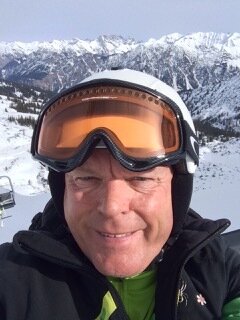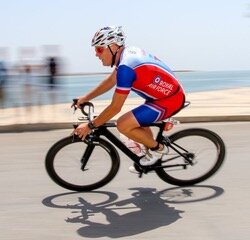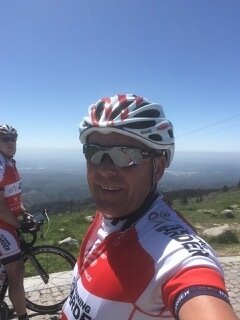Meet the Team – Dougal Gow explains what it is like living and training in Portugal
Here Dougal Gow gives a fantastic insight to how off-season training can be impacted when the weather doesn’t help you put your feet up or take some time off! Here he explains how “winter miles and winter smiles” are the same thing!
Dougal, you are fortunate enough to live somewhere, where the weather doesn’t limit the amount of cycling you can do (in fact, the summer season is probably more limited as your pool shuts!) How does this make taking some time off from the sport harder?
I find it quite easy to take time off, certainly from cycling, as I don’t feel that I have to get out on every sunny day. We are blessed with over 300 days of sunshine in the Algarve, so riding in the rain doesn’t happen…….because tomorrow it probably won’t be raining! The indoor pool shuts for the school holidays but this year I found an open air 50m pool that stays open for the whole of July and August. I rarely swim in 50m and to do it with the sunshine on your back is amazing. The first race of the season is usually in March and the last one is at the end of October, so its a long season if you do all the races. You are ready for a break during the winter, so the colder days are less inviting.
Clearly you can spend more time outdoors at this time of year than those in the UK, does that change how you train?
I get inundated with e-mails about winter clothing for running and cycling and Zwift looks like fun, but I haven’t been on a turbo trainer since I left the UK in 2016, and I only need long sleeves and knee warmers at worst in the winter!! Basically I can keep to a fairly disciplined training programme throughout the year, I am able to train outdoors all year round, so I have to ensure that some of my sessions are quite strict to ensure that I get the quality that a turbo session dictates. I basically use the festive season as a break, but try not to have a complete break. Its nice to have a steady ride in the sunshine in November-February. I still manage to fit a couple of weeks of skiing in each year, so that gives me a natural break from triathlon, it doesn’t do my liver any favours though!
Having been in the sport for a number of years, how have you been able to integrate the triathlon lifestyle?
When I was in the RAF it fitted in really well with my lifestyle. The discipline and the strict timing meant that I had to be rigid with my training and that was great….set times for meals and work equalled set times for training and recovering. Keeping fit was a priority in the military so my boss was nearly always very supportive for me to train knowing that my racing was representing the RAF and usually in my own time. Since retiring and moving to Portugal I find it more difficult as I have all day to train and often I think I’ll train later, only to have something crop up and then I miss a session. I have to be strict with myself otherwise sessions get missed and I could easily slip into bad habits and not train. The weather definitely helps here as the incentive to get out in the sun makes it easier.
You come from a skiing instructor background, how transferrable are some of those skills to triathlon?
Lots of the skills I learnt as a ski instructor are very transferrable to triathlon and particularly to Triathlon Coaching. The management of a group whether on the piste, in the sea, or on the roads are all very similar. You may have differing abilities, within a group, and you have to be able to cater for all of your group throughout the day. Skiing has so many different attributes that very few people are able to master all of them, so that transfers across to triathlon too. Just because you can swim under an hour for an Ironman doesn’t necessarily mean you can bike in under 5 hours or run a marathon in 3 hours. In skiing you may be able to ski very well on red runs, but when it gets steep and bumpy you may not be so happy! The discipline and the attention to detail are also very important. I have often seen skiers turn up at the bottom of the slopes with some kit missing, just like triathlon!! You can’t ski without your lift pass and you can’t compete in a triathlon without a helmet, but I’ve seen both happen lots of times! Be organised, get your kit ready the night before and have a check list that you use very time.
Do you find yourself using anything from skiing when coaching triathlon?
Yes, I am always aware that some people may be out of their comfort zone, whether that it is open water swimming, descending on the bike or trying to ski a black run. Everyone has their limits and it takes a good coach/instructor to be able to spot that an individual is not 100% confident in the situation. I have to have empathy as at some point in the past I have been there too. Big moguls on a black run, or swimming with 2000 other athletes at the mass start of an Ironman triathlon, it can be quite daunting and therefore you have to be able to recognise this and accommodate for all abilities. Gradual introduction to difficult situations is the way ahead, don’t try to run before you can walk! You wouldn’t normally ski on a black run on your first day, so it still amazes me that some people choose to do an Ironman as their first triathlon!!
We’re here to help
Tri Training Harder are one of the leading Triathlon coaching providers in the UK, using our wealth of experience to unite scientific and technological research with already well-established and successful best practices, to create a formula for triathlon and endurance coaching that works.
The result is an honest, dynamic, yet simple new way of constructing an athlete’s training to allow them to reach their potential.
If you’re planning your next season, just starting out in the sport or are looking for extra guidance at the very top end of the field, we are here to help, and our coaches would be delighted to hear from you. You can contact us via the website, and one of the team will be in touch.




